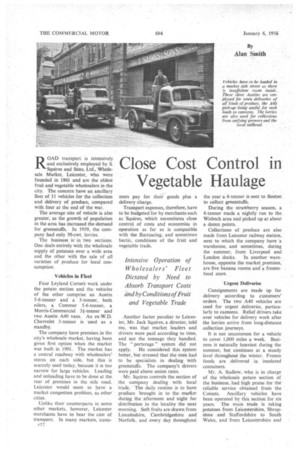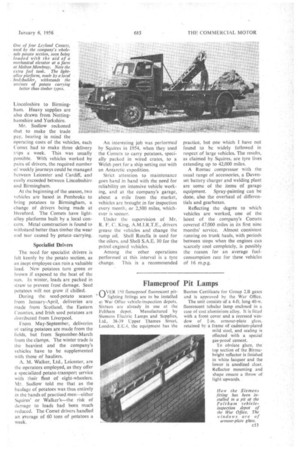Close Cost Control in Vegetable Haulage
Page 52

Page 53

If you've noticed an error in this article please click here to report it so we can fix it.
Intensive Operation of Wholesalers' Fleet Dictated by Need to Absorb Transport Costs and by Conditions of Fruit and Vegetable Trade
ROAD transport is intensively and exclusively employed by S. Squires and Sons, Ltd., Wholesale Market, Leicester, who were founded in 1861 and are the oldest fruit and vegetable wholesalers in the city. The concern have an ancillary fleet of 11 vehicles for the collection and delivery of produce, compared with four at the end of the war.
The average size of vehicle is also greater, as the growth of population in the area has increased the demand for greenstuffs. In 1939, the company had only 30-cwt. lorries.
The business isin two sections. One deals entirely with the wholesale supply of potatoes over a wide area and the other with the sale of all varieties of produce for local consumption.
Vehicles in Fleet Four Leyland Comets work under the potato section and the vehicles of the other comprise an Austin 5-6-tonner and a 3-tonner, both oilers, a Commer 5-6-tonner, a Morris-Commercial 3i-tonner and two Austin A40 vans. An ex-W.D. Chevrolet 3-tonner is used as a standby.
The company have premises in the city's wholesale market, having_ been given first option when the market was built in 1901. The market has a central roadway with wholesalers' stores on each side, but this is scarcely used today, because it is too narrow for large vehicles. Loading and unloading have to be done at the rear of premises in the side road. Leicester would seem to have a market congestion problem, as other cities.
'finlike their counterparts in some other markets, however, Leicester merchants have to bear the cost of transport. In many markets, custo c12 mers pay for their goods plus a delivery charge.
Transport expenses, therefore, have to be budgeted for by merchants such as Squires, which necessitates close control of costs and economies in operation as far as is compatible with the fluctuating, and sometimes hectic, conditions of the fruit and vegetable trade.
Another factor peculiar to Leicester, Mr. Jack Squires, a director, told me, was that market loaders and drivers were paid according to time, and not the tonnage they handled. The " porterage " system did not apply. He considered this system better, but stressed that the men had to be specialists in dealing with greenstuffs. The company's drivers were paid above union rates.
Mr. Squires controls the section of the company dealing with local trade. The daily routine is to have produce brought in to the matket during the afternoon and night for distribution in the locality the next morning. Soft fruits are drawn from Lincolnshire, Cambridgeshire and Norfolk, and every day throughout the year a 6-tonner is sent to Boston to collect greenstuffs.
During the strawberry season, a 6-tonner made a nightly run to the Wisbech area and picked up at about a dozen points.
Collections of produce are also made from Leicester railway station, next to which the company have -a warehouse, and sometimes, during the summer, from Liverpool and London docks. In another warehouse, opposite the market premises, are five banana rooms and a frozenfood store.
Urgent Deliveries Consignments are made up for delivery according to customers' orders, The two A40 vehicles are used for urgent deliveries, particularly to canteens. Relief drivers take over vehicles for delivery work after the lorries arrive from long-distance collection journeys.
It is not uncommon for a vehicle to cover 1,000 miles a week. Business is naturally heaviest during the summer, but continues at a steady level throughout the winter. Frozen foods are delivered in insulated containers.
Mr. A. Sudlow, who is in charge of the wholesale potato section of the business, had high praise for the reliable service obtained from the Comets. Ancillary vehicles have been operated by this section for six years. The main trade is taking potatoes from Leicestershire, Shropshire and Staffordshire to South Wales, and from Leicestershire and Lincolnshire to Birmingham. Heavy supplies are also drawn from Nottinghamshire and Yorkshire.
Mr. Sudlow reckoned that to make the trade pay, bearing in mind the operating costs of the vehicles; each Comet had to make three delivery trips a week. This was usually possible. With vehicles worked by pairs of drivers, the required number of weekly journeys could be managed bctween Leicester and Cardiff, and easily exceeded between Lincolnshire and Birmingham.
At the beginning of the season, two vehicles are based in Pembroke to bring potatoes to Birmingham, a change of drivers being made at Hereford. The Comets have lightalloy platforms built by a local concern. Metal construction is found to withstand better than timber the wear and teal' caused by potato % carrying.
Specialist Drivers
The need for specialist drivers is felt keenly by the potato section, as an inept employee can ruin a valuable toad. New potatoes turn green or brown if exposed to the heat of the sun. In winter, loads are packed in straw to prevent frost damage. Seed potatoes will not grow if chilled.
During the seed-potato season from January-April, deliveries are made from Scotland, the Eastern Counties, and Irish seed potatoes are distributed from Liverpool.
From May-September, deliveries of eating potatoes are made from the fields, but from September-March from the clamps. The winter trade is the heaviest and the company's vehicles have to be supplemented with those of hauliers.
A. M. Walker, Ltd., Leicester, are the operators employed, as they offer a specialized potato-transport service with their fleet of eight-wheelers. Mr. Sudlow told me that as the haulage of potatoes was thus entirely in the hands of practised men—either Squires' or Walker's—the risk of damage to loads had been much reduced. The Comet drivers handled an average of 60 tons of potatoes a week. An interesting job was performed by Squires in 1954, when they used the Comets to carry potatoes, specially packed in wired crates, to a Welsh port for a ship setting out with an Antarctic expedition.
Strict attention to maintenance goes hand in hand with the need for reliability on intensive vehicle working, and at the company's garage, about a mile from the market, vehicles are brought in for inspection every month, or 2,500 miles, whichever is sooner.
Under the supervision of Mr. R. F. C. King, A.M.T.R.T.E., drivers grease the vehicles and change the sump oil. Shell Rotella is used for the oilers, and Shell S.A.E. 30 for the
petrol-engined vehicles. .
Among the other operations performed at this interval is a tyre change. This is a recommended practice, but one which I have not found to be widely followed in respect of large vehicle& The results, as claimed by Squires, are tyre lives extending up to 42,000 miles.
A Romac compressor with the usual range of accessories, a Davenset battery charger and welding plant are some of the items of garage equipment. Spray-painting can be done, also the overhaul of differentials and gearboxes.
Reflecting the degree to which vehicles are worked, one of the latest of the company's Comets covered 47,000 miles in its first nine months' service. Almost consistent running on trunk hauls, with periods between stops when the engines can scarcely cool completely, is possibly the reason for an average fuelconsumption rate for these vehicles of 16 m.p.g.
















































































































